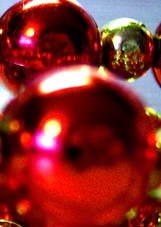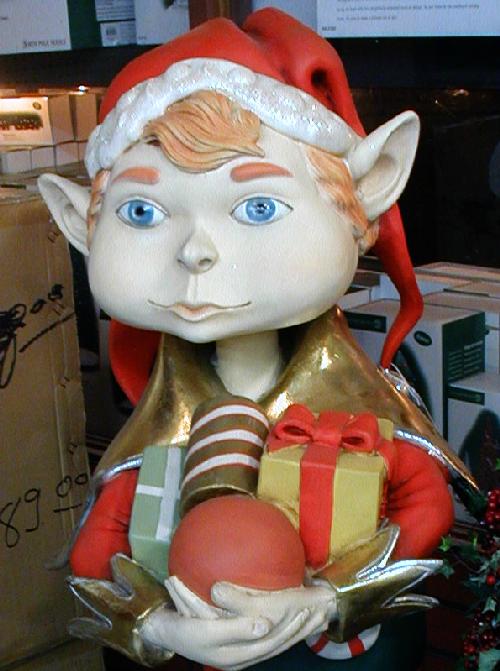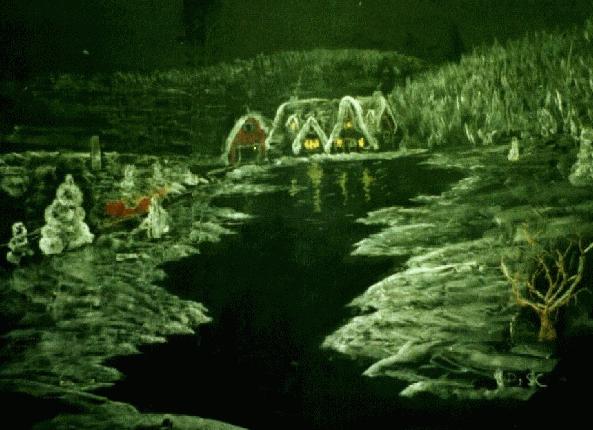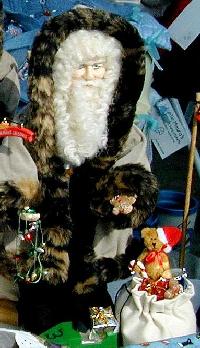|
Christmas and Yuletide Guide to Carols and Seasonal Cheer
for Pagans, Christians, and celebrants of all other persuasions
An Ancient Holiday
 The tree, the gifts, the wreath, the decorations, the 25th of December, brotherhood, mistletoe, Yuletide cheer, and Santa Claus in all his forms -- all the best features of the holiday season, have non-Christian origins. Unfortunately, its association with Christianity has caused the holiday to be shunned and ignored by non-Christians -- a great loss to them and to the season itself. There are many would-be carolers whose beliefs, or lack of same, prevent them from comfortably singing lyrics that refer to the Christian nativity, to whom Christmas itself, owing to its association with Christianity, is a foreign ritual whose meaning is distasteful or absent. It is to these that this collection of carols is dedicated -- as a resource for those who would celebrate the season as a secular or Pagan holiday. To those who regard their proprietary monopolistic monotheistic claims to be of greater importance than the wonderful message of the season, the universal sentiments of good will to all, brotherhood, tollerance, nobility, joy, and revelry, we wish you all the best but suspect that you will probably not rejoice in this collection.
The tree, the gifts, the wreath, the decorations, the 25th of December, brotherhood, mistletoe, Yuletide cheer, and Santa Claus in all his forms -- all the best features of the holiday season, have non-Christian origins. Unfortunately, its association with Christianity has caused the holiday to be shunned and ignored by non-Christians -- a great loss to them and to the season itself. There are many would-be carolers whose beliefs, or lack of same, prevent them from comfortably singing lyrics that refer to the Christian nativity, to whom Christmas itself, owing to its association with Christianity, is a foreign ritual whose meaning is distasteful or absent. It is to these that this collection of carols is dedicated -- as a resource for those who would celebrate the season as a secular or Pagan holiday. To those who regard their proprietary monopolistic monotheistic claims to be of greater importance than the wonderful message of the season, the universal sentiments of good will to all, brotherhood, tollerance, nobility, joy, and revelry, we wish you all the best but suspect that you will probably not rejoice in this collection.

Celebrating Yule
Christmas (or Yule, winter warming, or any of many other designations) in its many forms has reached us from ancient pre-Christian times, and will likely continue in some form long after its Christian mythology has been replaced. The message of rejoicing in the return of the sun remains, interpreted and adorned in various ways by the times through which it passes, taking on what is good and bad in every age but belonging to none. In that sense, it belongs to all of us, Christian and non-Christian, Jew, atheist, and every variety of "heathen" to celebrate as we see best.
A Rejected Holiday
As anti-Christmas Christians are quick to point out (see Holidays or Holy Days from gnmagazine.org and 4000 years of Christmas from The Good News ), there is no basis for a Christmas holiday in the Christian bible. References to the birth of Christ are brief, contain no holiday prescriptions (as are clearly to be found with other holidays) and the event apparently did not take place in December. They declare Christmas to be a Pagan holiday and discourage its celebration.
Did you realize that historians (and the Bible) agree that Jesus Christ wasn't born anywhere near Dec. 25? Or that this particular date was well known for its pagan religious celebrations long before Jesus Christ was born?
[ibid]
 Elf Delivery
The solstice has always been a special time to so many peoples of the world that, though the Christian church repudiated its celebration and at times illegalized it, the spirit of the season endures as clearly now as ever. With the failure of the church to quell solstice celebrations, they have been adopted, renamed, and adorned with tenuous Christian symbolism. Though its real origins have often been obscured, clad in a veneer of Christian pretense, the celebration continues, glorifying, commemorating and demonstrating eternal renewal and the noblest sentiments of humankind on a yearly basis.
Surviving Yuletide Carols
 The songs and carols attending the season have, perhaps, felt the impact of Christianity more than other aspects of the holiday. Banned at various times, those that reemerged did so in altered and vestigial form. Yuletide carols on Pagan themes have either been amended or augmented with Christian significance, or have been omitted into obscurity. Vestiges remain, however, some whole and some fragmentary. From these can be culled and gleaned the spirit of the season that proved so indomitable to the onslaught of church and orthodoxy.
Replacing Lyrics Neglected into Extinction
Familiar carols predominate, though in some cases some valuable but somewhat obscure works are included which can be sung to familiar melodies. Some carols have been amended for this collection. The justification for this lies in the many christianized texts known only in their apocryphal form and whose Pagan original no longer exists. Many such have been so consistently and unabashedly mangled to insert Christian mythology, that in the absence of the original, it seems only fair to change them in like manner to remove it.

So make merry with joyous holiday revels. Leave the mall and raise your voices in song. Quaff of the wassail, show brotherhood to enemy and friend, and be generous to those who need it most.
Yule
As early as two thousand years BC., the Indo-Europeans celebrated the turn of the sun, Hweolor tid, later, Yuletide, at or near the time of the winter solstice. It was a time of singing, rejoicing, and merrymaking, often feasting, and most particularly, "peace on earth and goodwill to men". The exact nature of celebrations varied from place to place and time to time but gift giving and gift givers, decorations, the tree, and a period of peace were all commonly a part of the celebration of light and the return of the sun from the south.
Christmas
Note: The word "Christmas", derived from Christ-mass, is the English word most commonly used in carols for the holiday season. Other Northern European languages use some variant of the season's older name, Yule. Thus we are restricted by the English language and the scan of the verse to the use of the word "Christmas". It may be replaced in most cases by "Yuletide" if necessary, but just as the word and celebration known as "Yule" was co-opted and redefined by Christians, the word "Christmas" may be given whatever meaning we choose to give it.
|

